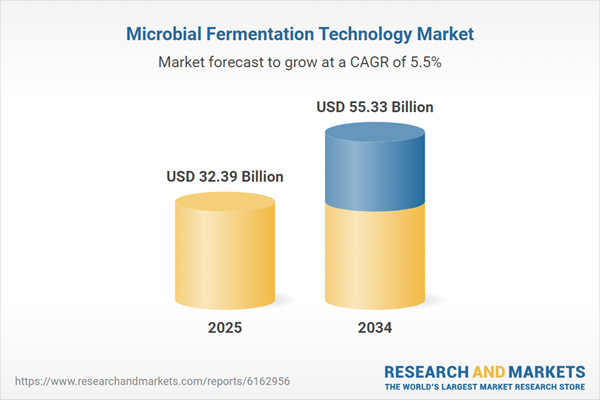Microbial Fermentation Technology: Introduction
Microbial fermentation is the biochemical process of extracting chemical energy from carbohydrates without oxygen. The process occurs in bacteria, yeasts, or even in muscles of humans. Microbial fermentation is performed by metabolic enzymes. A wide range of microorganisms are present during the fermentation and each of the microorganisms has a particular set of enzymes which is responsible for the amalgamation of sophisticated mixtures byproduct, which develops the foul taste and smell of fermented foods. The most common example of fermented edibles is alcohol beverages such as wine and beer, among others. The existence of microbial fermentation is spotted in almost every biomass.The definition of microbial fermentation is anaerobic conversion of sugar into alcohol and yeast. However, in the pharmaceutical sector, it is widely used to manage microorganisms for antibiotics, therapeutic proteins, enzymes, and insulin. Temperature-controlled tanks, also known as fermenters, are widely used for the fermentation with correct concentration of nutrients to harvest the solicited organism.
Global Microbial Fermentation Technology Market Analysis
The growth of the market is driven by several factors such as the increasing popularity of continuous fermentation processes due to their potential for increased productivity and reduced production costs compared to traditional batch fermentation. Continuous systems can provide a more stable environment for microorganisms, leading to higher yields and faster product generation. Rising automation and robotics developments have made it possible for researchers to screen a variety of microbes and fermentation conditions at high throughput, further propelling the global microbial fermentation technology market growth.Additionally, the research of microbial fermentation is increasingly using omics technologies, such as genomes, transcriptomics, proteomics, and metabolomics, among others. These technologies offer a thorough understanding of the genetic and metabolic characteristics of microorganisms, assisting in strain selection and procedure optimization.
Microbial fermentation is increasingly being explored as a means of converting waste materials into valuable products. This aligns with the principles of the circular economy, where waste is seen as a resource, promoting sustainable and environmentally friendly production methods. The rising emphasis on the use of renewable resources, such as feedstocks for microbial fermentation, is also increasing the microbial fermentation technology market demand. Agricultural byproducts, lignocellulosic biomass, and other non-food sources are some of them, reducing the dependency on fossil fuels and conventional raw materials.
Global Microbial Fermentation Technology Market Segmentations
Microbial Fermentation Technology Market Report and Forecast 2025-2034 offers a detailed analysis of the market based on the following segments:Market Breakup by Product Type
- Medical Products
- Antibiotics
- Probiotics
- Monoclonal Antibodies
- Recombinant Proteins
- Others
- Industrial Products
- Alcohol Beverages
- Food and Feed Products
- Others
Market Breakup by End User
- Bio-Pharmaceutical Companies
- Contract Research Organizations
- CMOs and CDMOs
- Academics and Research Institutes
- Food and Feed Institutes
- Others
Market Breakup by Region
- North America
- Europe
- Asia Pacific
- Latin America
- Middle East and Africa
Global Microbial Fermentation Technology Market Overview
The market for microbial fermentation has been witnessing significant growth during the historical period and is expected to keep growing in the coming years as well. The increasing demand for fermented food products and beverages, including natural and organic food products, is driving the market growth. Rising consumer health consciousness is increasingly contributing to the market growth. The ability of microbial fermentation to keep the food products intact and safe to eat for a longer time span is directly contributing to the global microbial fermentation market share. The increasing prevalence of infectious diseases is propelling the demand for more fermented microbial products, such as vaccines and antibiotics, which are used to treat patients from infections.The increasing demand for bio-based products is also supporting the market growth as microbial fermentation can be used to enhance the production of bio-based chemicals, fields, and other materials, which ultimately results in the fulfillment of eco-conscious consumers and industries. Microbial fermentation is widely used in the food and beverage industry to produce various products, including yogurt, cheese, bread, beer, wine, and other fermented foods. The growing demand for these products is augmenting the demand for microbial fermentation on a larger scale in the market.
Microbial Fermentation Technology Market: Competitor Landscape
The key features of the market report include patent analysis, grants analysis, clinical trials analysis, funding and investment analysis, partnerships, and collaborations analysis by the leading key players. The major companies in the market are as follows:- Biocon Ltd.
- Bio Vectra Inc.
- Danone Ltd.
- F. Hoffmann-La Roche AG
- Koninklijke DSM NV
- Lonza
- Novozymes A/S
- TerraVia Holdings, Inc.
- Biozeen
- United Breweries Ltd.
This product will be delivered within 3-5 business days.
Table of Contents
Companies Mentioned
- Biocon Ltd.
- Bio Vectra Inc.
- Danone Ltd.
- F. Hoffmann-La Roche AG
- Koninklijke DSM NV
- Lonza
- Novozymes A/S
- TerraVia Holdings, Inc.
- Biozeen
- United Breweries Ltd.
Table Information
| Report Attribute | Details |
|---|---|
| No. of Pages | 350 |
| Published | July 2025 |
| Forecast Period | 2025 - 2034 |
| Estimated Market Value ( USD | $ 32.39 Billion |
| Forecasted Market Value ( USD | $ 55.33 Billion |
| Compound Annual Growth Rate | 5.5% |
| Regions Covered | Global |
| No. of Companies Mentioned | 10 |









